929+1⁄3innings and posted a win–loss record of 43–53, with 30 complete games, five shutouts, and a 3.54 earned run average (ERA).
Contents
Although an average hitting pitcher in his major league career, posting a .175 batting average (50-for-286) with just 16 runs and 11 RBIs, he was a very good fielding pitcher, posting a .984 fielding percentage with only four errors in 258 total chances. [1]
Born and raised in Brooklyn, New York, Zoldak began his professional career in the low-level minor leagues, working his way up despite being released from his first team. The St. Louis Browns acquired him in 1944 and placed him on their major league roster. He debuted on May 23, and spent the next four years as a spot starter, working both as a starting pitcher and relief pitcher. He was traded to the Cleveland Indians in 1948, and helped lead the team to the 1948 World Series. After two more years with Cleveland, he was traded to the Philadelphia Athletics, the organization he originally started with, and played two seasons there. After a short minor league stint in 1953, he retired from the game, and died in 1966.
Early life and career
Zoldak, of Polish descent, was born on December 8, 1918, in Brooklyn, New York. He was raised by his mother, and worked at her confectionery shop, both while he was growing up and during the baseball offseason. [2] He attended Eastern District High School and took up the game of baseball at McCarren Park, as his high school did not have a baseball team. [3] He transferred from Eastern District to Textile High School where he swam competitively. [2] [4]
He began his professional career with the Palatka Azaleas in 1938, and threw 13 innings in two games. He was released afterwards, and played college baseball for the Fordham Rams baseball team while also playing some semi-professional baseball for a team in Cedarhurst, New York. [5] Zoldak was signed by Philadelphia Athletics owner Connie Mack before the 1941 season, ending his college baseball career and restarting his professional one. [1]
In 1941, Zoldak played for the Selma Cloverleafs and Williamsport Grays, pitching in 12 combined games. The following season, he spent the full year with Williamsport. In 32 games, he won and lost 11 each, and finished the year with an ERA of 2.54 in 177 innings pitched. [6] The following year, he remained in the Eastern League with the Elmira Pioneers due to the Williamsport team choosing not to field a team until the conclusion of World War II. [7] In 36 games for Elmira, Zoldak won 20 games, lost 11, and had a 2.73 ERA in 244 innings pitched. [6]
Major league career
On February 17, 1944, Zoldak was traded along with Barney Lutz to the St. Louis Browns for Frankie Hayes, as the Athletics wanted a veteran to add to their roster, while the Browns wanted the two prospects as they were classified as 4-F, and would be available to the team for the duration of the war. [8] He impressed the Browns coaching staff in spring training, and as a result was named to the opening day roster. [9] Zoldak made his major league debut on May 13, and was used as a reliever during his first season, pitching in 18 games and earning an ERA of 3.72. [1] The Browns made it to the 1944 World Series, but Zoldak did not see any action. He played in 26 games during the 1945 season, earning a 3–2 record with an ERA of 3.36. [1] In his final appearance of the season on September 29 against the Cleveland Indians, he was given the opportunity to start a game opposite Bob Feller. In a six-inning game shortened by rain, Zoldak and the Browns won, 2–1. [10]
Entering the 1946 season, manager Luke Sewell was reluctant to turn Zoldak into a starter, but eventually gave him the nod. His first two starts were both victories, one of which was a complete game shutout against the Chicago White Sox, which gave him credit for three of the Browns' first eight wins of the season. [11] He pitched in 35 games over the season, 21 of them starts, and ended the year with a 3.43 ERA, a 9–11 record, and a career-high 51 strikeouts. Unlike the previous season, Zoldak was slow to start in 1947, not winning his first game until June 22 against the Washington Senators. [12] He finished the season similar statistically to 1946: he played in 35 games and started 19, and had a record of 9–10 and a 3.47 ERA. [1] During the offseason, Cleveland Indians owner Bill Veeck offered $100,000 for Zoldak, but were turned down, and he remained on the Browns to begin the 1948 season. [13] Zoldak was projected to be the team's opening day starting pitcher against the Cleveland Indians, who had planned for him; instead he was used in relief and Fred Sanford was named the starter the day of the game. [14]
After spending the first two months of the season with the Browns, where he went 2–4 record in 11 games, he was traded to the Cleveland Indians on June 15, 1948, who added pitcher Bill Kennedy to go with their original offer of $100,000, a move which Bill Veeck called "a case of begging for him on our knees." [15] For the Indians, he served both as a relief pitcher and a fifth starting pitcher as he did with the Browns. On August 18, he faced his former team, and threw a complete-game shutout, defeating the Browns, 3–0. [16] A month later, he won two back-to-back games against the Detroit Tigers, both in extra innings. [17] During his time with the Indians, he went 9–6 with a 2.81 ERA in 23 games, 12 of them starts. He was on the Indians roster for the 1948 World Series and warmed up for all six games in the Indians' bullpen, but was never called upon to pitch; he was one of two on the roster who did not see any action in the World Series. [2]
Zoldak was moved to a relief role full-time for the 1949 season due to a lack of depth with the departures of Ed Klieman and Russ Christopher. [18] On July 27, Zoldak managed to hit his only career home run against the New York Yankees off Ed Lopat. However, the game was rained out, and the only home run of his career was erased. [19] In 27 games that season, Zoldak had a 1–2 record with a 4.25 ERA. [1] Zoldak had struggled in spring training the prior year due to both being out of shape and a lack of pitching control, but was impressive enough in 1950 after losing the weight and regaining his control that manager Lou Boudreau decided to put him in the starting rotation to begin the year. [20] He pitched poorly in his first starts, and was placed back in the bullpen for the rest of the year; Indians management considered demoting him to the minor leagues, and would have been sent to the San Diego Padres in May if not for the intervention of Johnny Berardino, who wanted to play on the west coast and agreed to a demotion instead. [21] Zoldak spent the full season with Cleveland, and had a 4–2 record and a 3.96 ERA in 33 games. [1]
Later life
As the 1951 season began, Zoldak was part of a three-way trade. On April 30, 1951, he was traded to the Philadelphia Athletics along with Ray Murray, which also involved the Chicago White Sox. Manager Jimmy Dykes brought Zoldak onto the Athletics with the intention of putting him in the starting rotation in place of Lou Brissie, who had been sent to the Indians in the same trade. [22] On July 15, Zoldak pitched a one-hitter against the Chicago White Sox in what was called "the greatest game of his career", [23] and followed that up with a complete game against the Indians, allowing one run in nearly ten innings of work. [24] In 26 games for the Athletics, 18 of them starts, he had a 6–10 record and a 3.16 ERA. [1] Before the 1952 season began, manager Dykes planned on giving Zoldak more rest between starts to try to maximize what he could provide for the team, as he had been growing tired when overused during the season. [25] Zoldak pitched in 16 games in 1952, and had a 0–6 record and a 4.06 ERA. [1]
On February 2, 1953, the Athletics released Zoldak unconditionally, considering him expandable due to the team having 20 pitchers on their spring training roster. [26] He was given a tryout with the Toronto Maple Leafs, but after salary negotiations fell through he signed with the Seattle Rainiers of the Pacific Coast League. [27] Zoldak pitched briefly for the Rainiers, appearing in two games before being released by the team; he retired from the game after his release. [6] After retiring, he became a box office man, working at sporting events as well as shows on Broadway. [28] Zoldak, who never married, died of lung cancer on August 25, 1966, leaving behind his mother and three siblings, and is buried in the Cemetery of the Holy Rood in Westbury, New York. [29]
Related Research Articles

Early Wynn Jr., nicknamed "Gus", was an American professional baseball right-handed pitcher. He played in Major League Baseball (MLB) for the Washington Senators, Cleveland Indians, and Chicago White Sox, during his 23-year MLB career. Wynn was identified as one of the most intimidating pitchers in the game, having combined his powerful fastball with a hard attitude toward batters. He was inducted into the Baseball Hall of Fame in 1972.

Samuel Pond "Sad Sam" Jones was an American professional baseball pitcher who played in Major League Baseball with the Cleveland Indians, Boston Red Sox, New York Yankees, St. Louis Browns, Washington Senators and Chicago White Sox between 1914 and 1935. Jones batted and threw right-handed. His sharp breaking curveball also earned him the nickname "Horsewhips Sam".
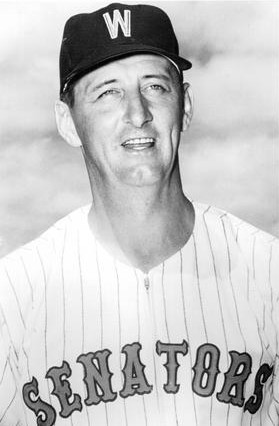
Richard Edward Donovan was an American Major League Baseball pitcher who played for the Boston Braves (1950–1952), Detroit Tigers (1954), Chicago White Sox (1955–1960), Washington Senators (1961) and Cleveland Indians (1962–1965). He batted left-handed and threw right-handed, stood 6 feet 3 inches (1.91 m) tall and weighed 190 pounds (86 kg).

Stephen Joseph Gromek was an American right-handed pitcher in Major League Baseball who played for 17 seasons in the American League with the Cleveland Indians and Detroit Tigers. In 447 career games, Gromek pitched 2,064+2⁄3 innings and posted a win–loss record of 123–108 with 92 complete games, 17 shutouts, and a 3.41 earned run average (ERA).
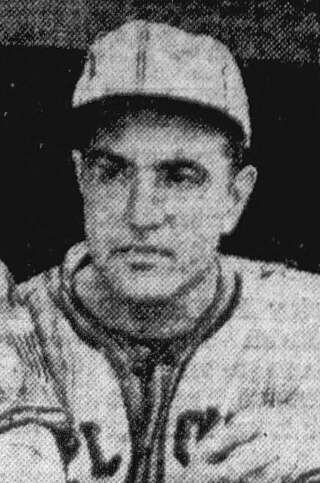
Nelson Thomas Potter was an American professional baseball player and right-handed pitcher who appeared in 349 games in Major League Baseball over a dozen seasons between 1936 and 1949, most notably as a member, in 1944, of the only St. Louis Browns team to win an American League pennant. He also played for the St. Louis Cardinals, Philadelphia Athletics, Boston Red Sox and Boston Braves. Potter's repertoire featured the screwball.

Russell Ormand Christopher was a professional baseball pitcher who played in Major League Baseball for seven seasons with the Philadelphia Athletics (1942-1947) and Cleveland Indians (1948). In 241 career games, Christopher pitched 999+2⁄3 innings and posted a win–loss record of 54–64, with 46 complete games, three shutouts, and a 3.37 earned run average (ERA).
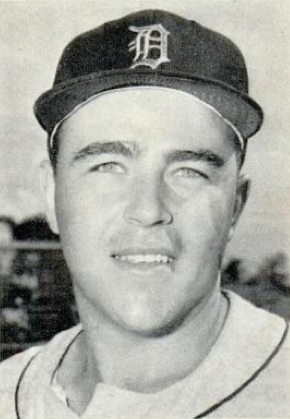
Ned Franklin Garver was an American professional baseball player. He played in Major League Baseball (MLB) as a right-handed pitcher for the St. Louis Browns (1948–1952), the Detroit Tigers (1952–1956), the Kansas City Athletics (1957–1960), and the Los Angeles Angels (1961). Garver and Irv Young are the only pitchers in the modern era of baseball to win 20 or more games for a team that lost 100 games.
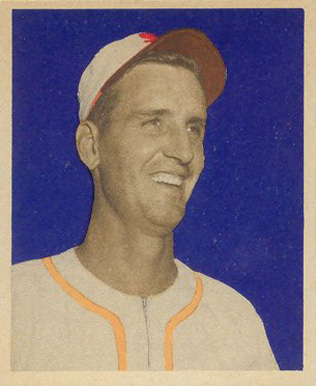
William Aulton Kennedy, nicknamed "Lefty", was a pitcher for the Cleveland Indians, St. Louis Browns, Chicago White Sox, Boston Red Sox and Cincinnati Redlegs of Major League Baseball (MLB) between 1948 and 1957.
Edward Frederick "Specs" Klieman was an American professional baseball pitcher. He played in Major League Baseball (MLB) in all or portions of eight seasons (1943–1950) for the Cleveland Indians, Washington Senators, Chicago White Sox and Philadelphia Athletics. For his career, he compiled a 26–28 won–lost record, with 33 saves, in 222 appearances, with a 3.49 earned run average and 130 strikeouts. Klieman was a relief pitcher on the 1948 World Series champion Indians, pitching in one World Series game, giving up three runs without recording an out.

Lester Elmer Webber was an American Major League Baseball right-handed pitcher who played for six seasons. He played for the Brooklyn Dodgers from 1942 to 1946 and the Cleveland Indians in 1946 and 1948. In 154 career games, Webber pitched 432 innings and had 23 wins, 19 losses, and a 4.19 earned run average (ERA).
Donald Paul Black was an American right-handed pitcher in Major League Baseball who played for six seasons in the American League with the Philadelphia Athletics and Cleveland Indians. In 154 career games, Black pitched 797 innings and posted a win–loss record of 34–55, with 37 complete games, four shutouts, and a 4.35 earned run average (ERA).
The 1948 Boston Red Sox season was the 48th season in the franchise's Major League Baseball history. After 154 regular-season games, the Red Sox and Cleveland Indians finished atop the American League with identical records of 96 wins and 58 losses. The teams then played a tie-breaker game, which was won by Cleveland, 8–3. Thus, the Red Sox finished their season with a record of 96 wins and 59 losses, one game behind Cleveland.
The 1948 St. Louis Browns season involved the Browns finishing 6th in the American League with a record of 59 wins and 94 losses. It was the first Browns baseball season to be telecast on local television, having debuted its game broadcasts that year on KSD with Bob Ingham on the commentary box as the play by play announcer, nearly a year after other MLB teams made their television debuts.
The 1948 Cleveland Indians season was the 48th in franchise history. When the regular season resulted in a first place tie, the Indians won a one-game playoff against the Boston Red Sox to advance to the World Series. Cleveland won the championship by defeating the Boston Braves 4 games to 2 for their first World Series win in 28 years. The Sporting News ranked the 1948 Indians the ninth-best team.
The 1951 Chicago White Sox season was the team's 51st season in the major leagues, and its 52nd season overall. They finished with a record of 81–73, good for fourth place in the American League, 17 games behind the first place New York Yankees.
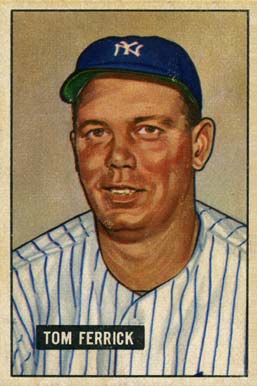
Thomas Jerome Ferrick was an American Major League Baseball pitcher, pitching coach and scout. Primarily a relief pitcher, he stood 6 ft 2+1⁄2 in (1.89 m) tall and weighed 220 pounds (100 kg) in his playing days. He batted and threw right-handed.
The 1951 Cleveland Indians season was a season in American baseball. The team finished second in the American League with a record of 93–61, 5 games behind the New York Yankees.

Corey Scott Kluber is an American former professional baseball pitcher. He played in Major League Baseball (MLB) for the Cleveland Indians, Texas Rangers, New York Yankees, Tampa Bay Rays and Boston Red Sox. He made his MLB debut in 2011 as a member of the Indians. A power pitcher, Kluber achieved high strikeout rates through a two-seam sinker and a breaking ball that variously resembled a slider and a curveball.

Henry Eugene Bearden was an American professional baseball pitcher, a left-hander who played in Major League Baseball (MLB) from 1947 to 1953 for the Cleveland Indians, Washington Senators, Detroit Tigers, St. Louis Browns and Chicago White Sox. In 193 career games, Bearden pitched 7881⁄3 innings and posted a win–loss record of 45–38, with 29 complete games, seven shutouts, 259 strikeouts, and a 3.96 earned run average (ERA).

On July 10, 1932, the Philadelphia Athletics beat the Cleveland Indians 18–17 in 18 innings in a Major League Baseball game played at League Park in Cleveland. Several major-league records were set during the game; for example, Johnny Burnett of the Indians became the only player to hit safely nine times in a game, while Cleveland's 33 hits and the teams' combined 58 hits are also single-game records. Pitcher Eddie Rommel secured the win for the Athletics, pitching an American League-record 17 innings in relief after Philadelphia's Lew Krausse gave up three runs in the first inning. The 29 hits Rommel allowed are a major-league record; the 14 runs against him are the most given up by a winning pitcher.
References
- 1 2 3 4 5 6 7 8 9 "Sam Zoldak Statistics and History". Baseball-Reference. Retrieved January 27, 2012.
- 1 2 3 Murphy, Jimmy (October 21, 1948). "Series' Forgotten Man". The Brooklyn Daily Eagle. p. 24.
- ↑ Burr, Harold C. (January 14, 1951). "Flock Faces Red If Zoldak Becomes Fireman Of The Year". The Brooklyn Daily Eagle . p. 23 – via Newspapers.com.

- ↑ Turkin, Hy (June 9, 1946). "Rising Rookies". Daily News . p. 34. Retrieved January 18, 2024.
- ↑ "Parkways, Led By Gray, Test For Bushwicks". The Brooklyn Daily Eagle. July 17, 1940. p. 14.
- 1 2 3 "Sam Zoldak Minor League Statistics and History". Baseball-Reference. Retrieved May 27, 2016.
- ↑ Jones, Welly (March 16, 1943). "The Old Timer". Harrisburg Telegraph . p. 13.
- ↑ "A Little Something Extra!". Williamsport Sun-Gazette . February 23, 1944. p. 2.
- ↑ "A Little Something Extra!". Williamsport Sun-Gazette. April 8, 1944. p. 2.
- ↑ "St. Louis Defeats Bob Feller, 2-1". The Cumberland News . September 29, 1945. p. 10.
- ↑ Reichler, Joe (May 4, 1946). "Zoldak Gives Promise Of Becoming St. Louis Brownie Mound Ace". Alton Evening Telegraph . p. 12 – via Newspapers.com.

- ↑ "Blackwell and Reds Blank Dodgers, 4-0". The Daily Register . June 23, 1947. p. 5.
- ↑ "Waitkus May Go To Dodgers". The Bridgeport Post . December 9, 1947. p. 16.
- ↑ "Record 60,000 Crowd To See Tribe Play Browns". The Plain Dealer . April 20, 1948. p. 1.
- ↑ "Red Sox Trounce Indians, 7-3; Indians Acquire Zoldak in Trade". The Plain Dealer. June 16, 1948. p. 26.
- ↑ "Tribe Boosts Lead To Three Games As Zoldak Blanks Browns, 3-0". The Plain Dealer. August 19, 1948. p. 16.
- ↑ Cobbledick, Gordon (January 26, 1949). "Plain Dealing". The Plain Dealer. p. 22.
- ↑ "Paige, Zoldak To Shoulder Relief Duties For Tribe". The Plain Dealer. March 4, 1949. p. 20.
- ↑ "Rain Halts Indian-Yankee Game With Teams Deadlocked, 4-4". The Plain Dealer. July 28, 1949. p. 21.
- ↑ Jones, Harry (April 23, 1950). "Sad Sam Sees Silver Lining". The Plain Dealer. p. 2.
- ↑ Jones, Harry (May 20, 1950). "Zoldak's Relief Pitching Gives Tribe 4-1 Victory Over Red Sox". The Plain Dealer. p. 16.
- ↑ Morrow, Art (May 9, 1951). "A's Get What They Needed - Lots Of Help". The Sporting News . p. 7.
- ↑ "Zoldak Hurls 1-Hit Victory To Give A's Sweep Over White Sox". The Plain Dealer. July 16, 1951. p. 22.
- ↑ Morrow, Art (August 1, 1951). "Sad Sam Gives Athletics Glad News With Mound Work". The Sporting News. p. 8.
- ↑ "Athletics' Sam Zoldak Real Sleeper of Staff". The Paris News . April 13, 1952. p. 10.
- ↑ "Mack Mites". The Sporting News. February 11, 1953. p. 13.
- ↑ "Zoldak Hurls For Rainiers". The Bee . May 13, 1953. p. 8.
- ↑ "Whatever Happened to Sad Sam Zoldak?". The Terre Haute Tribune . February 23, 1959. p. 11.
- ↑ "Sam Zoldak, Ex-Indians Pitcher, Dies". Valley Morning Star . August 26, 1966. p. 9.
External links
- Career statistics from Baseball Reference, or Fangraphs
- Sam Zoldak at Find a Grave
| Sam Zoldak | |
|---|---|
 Zoldak's 1949 Bowman Gum baseball card | |
| Pitcher | |
| Born:December 8, 1918 Brooklyn, New York, U.S. | |
| Died: August 25, 1966 (aged 47) New Hyde Park, New York, U.S. | |
Batted: Left Threw: Left | |
| MLB debut | |
| May 13, 1944, for the St. Louis Browns | |
| Last MLB appearance | |
| August 26, 1952, for the Philadelphia Athletics |
Cleveland Indians 1948 World Series champions | |
|---|---|
| |
| |